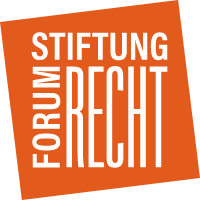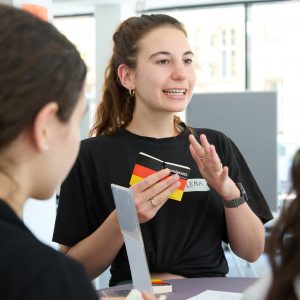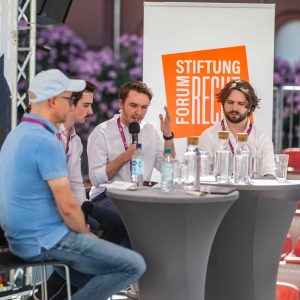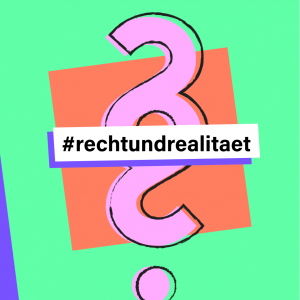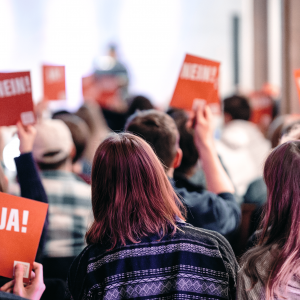Digital Symposium 3.0
The digital international symposium 3.0 of the Stiftung Forum Recht is dedicated to the education of law and the rule of law. We will inquire into the potentials and challenges of the content-related intersections of the rule of law and democracy, human rights and historical narratives of injustice.
The Rule of law in Context
How can the rule of law be transmitted? How do we exhibit law and human rights? What role does the rule of law play in political and civic education? The symposium seeks to answer these and other questions in three thematic sections. Short multi-perspective keynote addresses and selected international educational and exhibition projects will be presented and discussed in order to assist the Stiftung Forum Recht in further sharpening its profile.
Rule of Law and Injustice
How have (trans)national experiences of injustice influenced the formation of constitutional states and how have they affected the appreciation and criticism of the rule of law?
What challenges and problems might accompany a teleological perspective on German and European constitutional history? And what consequences should be drawn from this for the teaching of law and the rule of law?
Is the experience of injustice necessary to effectively address the development of the rule of law?
Rule of Law and Democracy
Democracy and the rule of law are interdependent but describe different aspects of social principles of order and participation.
What role should concepts of democracy and civic education play in teaching about the law and the rule of law?
How should educational approaches to law and the rule of law be designed in order to not primarily relate to democracy in terms of content?
What forms and goals should the teaching of the rule of law take?
Rule of Law and Human Rights
In the past decade, numerous museums and cultural institutions with a special thematic focus on human rights within the context of their national history have been established around the globe.
How does the idea of the German term for the rule of law – “Rechtsstaat” – fit into the context of international concepts of „rule of law“, “checks and balances” and „état de droit“?
Where do the ideas, concepts and systems associated with these terms differ?
What significance do human rights play in the German und international understanding of the rule of law?
Sie sehen gerade einen Platzhalterinhalt von YouTube. Um auf den eigentlichen Inhalt zuzugreifen, klicken Sie auf die Schaltfläche unten. Bitte beachten Sie, dass dabei Daten an Drittanbieter weitergegeben werden.
Mehr InformationenVIdeo keynote by Prof. Dr. Andreas Wirsching
(Leibniz Institute for Contemporary History, Munich)
Prof. Dr. Andreas Wirsching, born in 1959, is Director of the Leibniz Institute for Contemporary History Munich-Berlin and holds the Chair of Modern History at the Ludwig Maximilian University of Munich. He studied history and Protestant theology, received his doctorate from the University of Erlangen in 1988 and habilitated in modern and contemporary history at the University of Regensburg in 1995. From 1996 to 1998 he taught as Professor of Modern and Contemporary History of Western Europe at the University of Tübingen. From 1998 to 2011 he held the Chair of Modern and Contemporary History at the University of Augsburg. He is a member of the Bavarian Academy of Sciences and Humanities, among others. His main research interests are: Comparative German and French history in the 20th century, history of the Weimar Republic, communism, fascism and National Socialism 1918 – 1945, German and European history since the 1970s, and history and theory of modernity.
You can download the English language abstract as PDF here.
Sie sehen gerade einen Platzhalterinhalt von YouTube. Um auf den eigentlichen Inhalt zuzugreifen, klicken Sie auf die Schaltfläche unten. Bitte beachten Sie, dass dabei Daten an Drittanbieter weitergegeben werden.
Mehr InformationenVIdeo keynote by Prof. Dr. Peer Zumbansen
(McGill University, Montreal)
Professor Zumbansen studied law and philosophy in Frankfurt, Paris (Nanterre) and Harvard before joining Osgoode Hall Law School in Toronto as Canada Research Chair in Comparative and Transnational Corporate Governance. 2014 Zumbansen was appointed inaugural Professor of Transnational Law and Founding Director of the Transnational Law Institute at the Dickson Poon School of Law, King’s College London. Since January 2021, he is the inaugural Professor of Business Law at McGill University, Faculty of Law, Montreal. Visiting Professorships include Yale, Melbourne, Bremen, Rome, Lucerne, St Gallen, Bilbao, Dublin, Bilbao and Sao Paulo. Professor Zumbansen is author of several books and edited collections in private law, corporate law, legal theory and transnational law. Recent publications include “The Many Lives of Transnational Law: Critical Engagements with Jessup’s Bold Proposal” (Cambridge 2020) and the “Oxford Handbook of Transnational Law” (Oxford 2021). From 2000-2013 he was Co-editor in chief of the German Law Journal (www.germanlawjournal.com).
You can download the English language abstract as PDF here.
Sie sehen gerade einen Platzhalterinhalt von YouTube. Um auf den eigentlichen Inhalt zuzugreifen, klicken Sie auf die Schaltfläche unten. Bitte beachten Sie, dass dabei Daten an Drittanbieter weitergegeben werden.
Mehr InformationenVideo keynote by Prof. Dr. Nora Sternfeld
(HFBK Hamburg)
Nora Sternfeld is an art educator and curator. She is professor for art education at the HFBK Hamburg. From 2018 to 2020 she was documenta professor at the Kunsthochschule Kassel. From 2012 to 2018 she was Professor of Curating and Mediating Art at Aalto University in Helsinki. In addition, she is co-director of the /ecm – Master Program for Exhibition Theory and Practice at the University of Applied Arts Vienna, in the core team of schnittpunkt. austellungstheorie & praxis, co-founder and part of trafo.K, Office for Art, Education, and Critical Knowledge Production (Vienna) and since 2011 part of freethought, Platform for Research, Education and Production (London). In this context she was also one of the artistic directors of the Bergen Assembly 2016 and is since 2020 BAK Fellow, basis voor actuele kunst (Utrecht). She publishes on contemporary art, educational theory, exhibitions, politics of history and anti-racism.
You can download the English language abstract as PDF here.
Sie sehen gerade einen Platzhalterinhalt von YouTube. Um auf den eigentlichen Inhalt zuzugreifen, klicken Sie auf die Schaltfläche unten. Bitte beachten Sie, dass dabei Daten an Drittanbieter weitergegeben werden.
Mehr InformationenVideo keynote by Prof. Dr. Angelika Nußberger
(University of Cologne)
Angelika Nußberger has been a professor at the University of Cologne since 2002 and holds the Chair of Constitutional Law, International Law and Comparative Law and is Director of the Institute for Eastern European Law and Comparative Law. She is currently establishing an academy for European human rights protection at the university of Cologne. She is also a member of the Venice Commission of the Council of Europe, an international judge at the Constitutional Court of Bosnia and Herzegovina and an advisor on international law to the German Foreign Office. She was the judge elected for Germany at the European Court of Human Rights from 2011 to 2019, and its Vice-President from 2017 until the end of her mandate. She studied Slavic studies, modern German literature and Romance studies as well as law in Munich and Würzburg. In 1985, she was in Moscow for a study visit, and from 1994 to 1995 she was a visiting researcher at Harvard Law School.
You can download the English language abstract as PDF here.
Project presentations
Rule of law and injustice
Education and exhibition concepts on the rule of law in relation to the experience of historical injustice.
How do narratives of injustice shape the way the rule of law is communicated in curatorial practice and educational work, and what pitfalls are associated with it?
Rule of law and democracy
Educational approaches in the context of the rule of law and the promotion of democracy.
How can the synergy of both concepts be used to the advantage of teaching law and the rule of law? Where do we need to make a central distinction?
Rule of law and human rights
Putting the law on display? Designing exhibitions about the rule of law and human rights.
How can human rights be communicated and displayed on an institutional level, and what significance could the rule of law have as a theme in this context?
Archiv Bürgerbewegung Leipzig e.V.
Speakers: Achim Beier, Balthasar Dusch
On the 9th of October 1989, more than 70,000 people marched on the streets and protested against the dictatorial regime of the SED (Socialist Unity Party of Germany). On that so-called Day of Decision, the end of the rule of the Socialist Unity Party of Germany and the GDR was heralded after 40 years. One month later, the Berlin Wall fell and the way for the reunification of both German states was paved. Many small acts of protest preceded this historically significant event. Since the founding in 1991, the Archiv Bürgerbewegung Leipzig e.V. (Archives of Citizens’ Movement Leipzig, registered association) has been collecting the personal testimonials of the opposition in the GDR, the citizens’ movement and the campaign groups and parties established in the years 1989–90 to save and preserve them permanently, to render them accessible and make them open to the public.
Achim Beier studied from 1992 to 1999 History as well as Communication and media studies at the University of Leipzig. Since 2006 he works as Project member at the Archiv Bürgerbewegung Leipzig e.V.( “Archives of Citizens’ Movement Leipzig”). He designs and develops traveling and open-air-exhibitions as well as online presentations, focusing on east central European influences on the Peaceful Revolution in the GDR. Also he organizes the remembrance project STOLPERSTEINE for the Victims of the national-socialist Regime in Leipzig.
Balthasar Dusch (*1993) works for the Archiv Bürgerbewegung Leipzig e.V.( “Archives of Citizens’ Movement Leipzig”) (ABL). Study of history and political science at the University of Regensburg (B.A.) as well as medieval and newer history at the University of Leipzig (M.A.). At the ABL responsible for the Project of archiving the documents of the Vereinigung der Opfer des Stalinismus (“Association of Victims of Stalinism“) (VOS).
“Die Verfassungsschüler”
Speakers: Magdalena Strauch, Inga Wölfinger
„Die Verfassungsschüler“ makes democracy tangible, inspires young people for participation and democracy and accompanies them on the way to their own social engagement. In workshops, excursions and encounters, they learn about democracy, their rights and their own role in society, and are strengthened to actively advocate for their interests. In the process, they are individually accompanied and supported by democracy scouts in schools and youth institutions. Democracy scouts receive valuable knowledge in the area of democracy education through further education formats in the project and can implement this in a practical way.
https://www.teachfirst.de/demokratiebildung/verfassungsschueler/
After graduating from high school Magdalena Strauch completed a voluntary social service in India and completed her studies in theology in Bonn, Jerusalem and Frankfurt. From 2014 to 2016 she was a Teach-First-Fellow at a school in Hamburg, where she worked with students in an international preparatory class – also in the area of democracy education. After two years in educational counseling in a scholarship program for refugees at Caritas in Berlin, she has been working in the project „Die Verfassungsschüler“ at Teach First Deutschland since 2018, which she implemented as a model project with young people in Berlin from 2018 to 2019. Since 2020 she has taken over the project management for „Die Verfassungsschüler“.
Inga Wölfinger studied Public Administration and European Studies at the Universities of Münster and Enschede. After taking first steps in the field of political education in Berlin, she continued her studies in International Politics and International Law at the University of Kiel. Since 2017, she’s been working as a trainer in political education in the fields of prevention of right-wing extremism, anti-discrimination and the promotion of democracy. In January 2021, she started working in the project „Die Verfassungsschüler“ at Teach First Deutschland in which she’s responsible for the field of qualification, education and training.
Canadian National Museum of Human Rights, Winnipeg
Speaker: Clint Curle
The Canadian Museum for Human Rights is centred around the idea that respect and understanding of human rights can serve as a positive force for change in the world. Our mandate is to explore the subject of human rights, with special but not exclusive reference to Canada, in order to enhance the public’s understanding of human rights, to promote respect for others, and to encourage reflection and dialogue. As with all of Canada’s National Museums, the Museum plays an essential role in preserving and promoting our heritage at home and abroad, contributing to the collective memory and sense of identity of all Canadians, and inspiring research, learning, and entertainment that belong to all Canadians.
Dr. Clint Curle is Vice-President of Research and Exhibitions at the Canadian Museum for Human Rights. Clint began his career in the legal profession and before joining the Museum in 2010 he was a university professor, executive director of a human rights NGO, and a parish pastor. His education includes a PhD in political science, MA degrees in law and theology, and a law degree.
Munich Documentation Centre for the History of National Socialism
Speaker: Dr. Mirjam Zadoff
The Munich Documentation Centre for the History of National Socialism is a place of education and remembrance documenting and addressing the crimes of the Nazi dictatorship and their origins, manifestations and consequences right up to the present day. Its permanent exhibition documents the history of National Socialism in Munich, the city’s special role in the Nazi system of terror and Munich’s difficulties in confronting its past after 1945. As well as the permanent exhibition, there are also a series of special exhibitions, a learning centre, a varied programme of events and various educational resources.
Mirjam Zadoff is Director of the Munich Documentation Centre for the History of National Socialism; previously she held the Alvin H. Rosenfeld Chair for Jewish Studies and was Associate Professor for History at Indiana University Bloomington. She is a member of the Bavarian Academy of Sciences, and was visiting faculty at ETH Zurich, UC Berkeley, HU Berlin and Augsburg University. Among her publications are: Werner Scholem. A German Life (2018), Next Year in Marienbad. The Lost Worlds of Jewish Spa Culture (2012), and forthcoming, edited together with Nicolaus Schafhausen: Tell me about yesterday tomorrow.
demoSlam
Speaker: Dr. Evgenyia Sayko
demoSlam is a new entertaining discussion format on controversial social issues. Participants with different opinions work in pairs on a presentation in which they show their differences and similarities – creative, entertaining and based on their everyday personal experience.
www.demoslam.org
Evgeniya Sayko (Phd in Cultural Studies) researches ways for establishing new ways for dialogue at the interface of analysis and practice. Among other things, she developed the demoSlam dialogue format as part of her project “Value discourse with Russia: ” and co-founded the MAGNET – Lab for Mutual Understanding.
National Center for Civil and Human Rights, Atlanta
Speaker: Jill Savitt
The National Center for Civil and Human Rights is a museum and human rights organization in Atlanta that inspires people to tap their own power to change the world around them. The Center’s iconic exhibitions feature the papers and artifacts of Dr. Martin Luther King, Jr.; the history of the US civil rights movement; and stories from the struggle for human rights around the world today. Its education program brings history alive for students and provides teachers with tools to teach civil rights history by provoking critical thinking about democratic practice and civic participation.
https://www.civilandhumanrights.org/
Jill Savitt, the President and CEO of the National Center for Civil and Human Rights, is a human rights advocate with expertise in genocide and atrocity prevention. She assumed the role in March 2019, but has been involved with The Center since 2010 when she curated the Center’s exhibit on global human rights. Previously, Savitt was the Acting Director of the Simon-Skjodt Center for the Prevention of Genocide at the US Holocaust Memorial Museum in Washington, DC. The Center stimulates global action to prevent genocide and to catalyze an international response when it occurs.
She began her career as a reporter for WAMU, the NPR affiliate in Washington, DC. Savitt graduated summa cum laude, Phi Beta Kappa from Yale University and is a member of the Council on Foreign Relations.
Apartheid Museum Johannesburg
Speaker: Emilia Potenza
The Apartheid Museum opened in Johannesburg in 2001. It is acknowledged as the
pre-eminent museum in the world dealing with 20th century South Africa, at the heart
of which is the apartheid story.
Starting with the discovery of gold on the Witwatersrand in 1886 and ending with the transition to democracy in 1994, the Apartheid Museum powerfully illustrates the rise and fall of apartheid.
https://www.apartheidmuseum.org/
Emilia Potenza is the curator of exhibitions and education at the Apartheid Museum in Johannesburg. She is passionate about history, education and art and the intersection between them. She and her colleagues have created opportunities for a wide range of visitors to engage with South Africa’s history, and to draw on the crucial lessons that this offers.
Throughout her career, Emilia has been involved in fighting racism and discrimination through education. As a student and then a teacher, she was actively involved in opposing apartheid in the late 1970s and 1980s, principally through building South Africa’s first non-racial teachers’ organisation. She has also written many groundbreaking History & English textbooks.
Emilia has worked at the Apartheid Museum since its inception in 2001.
National Constitution Center Philadelphia
Speaker: Jeffrey Rosen
The National Constitution Center in Philadelphia is a private, nonprofit organization serving as America’s leading platform for constitutional education and debate with the aim to disseminate information about the U.S. Constitution on a nonpartisan basis.
As the Museum of We the People, the Center brings the Constitution to life for visitors of all ages through interactive programs and exhibits. As America’s Town Hall, the Center brings the leading conservative and liberal thought leaders together to debate the Constitution on all media platforms. As a Headquarters for Civic Education, the Center delivers educational programs and online resources that inspire citizens and engage all Americans in learning about the U.S. Constitution.
https://constitutioncenter.org
Jeffrey Rosen is President & CEO of the National Constitution Center. He is also a Professor of Law at The George Washington University Law School and a Contributing Editor of The Atlantic. Rosen is a graduate of Harvard College, Oxford University, and Yale Law School. He is the author of seven books including biographies of Louis Brandeis and William Howard Taft. His most recent book is Conversations with RBG: Justice Ruth Bader Ginsburg on Life, Love, Liberty, and Law. His essays and commentaries have appeared in The New York Times Magazine, on National Public Radio, in the New Republic, where he was the legal affairs editor, and in The New Yorker, where he has been a staff writer.
Museo de la Memoria y los Derechos Humanos, Santiago de Chile
Speaker: Rayén Gutiérrez Cortés
The Museo de la Memoria y los Derechos Humanos is a place of ethical reflection on the violations of life and dignity committed by the Chilean state between 11 September 1973 and 10 March 1990.
Its main objectives include making these results visible, paying tribute to the victims and their families, and stimulating reflection and debate on the importance of democracy and tolerance in order to prevent history from repeating itself. The museum aims to build a bridge between citizens and a part of their history to bring about commitment to the full appreciation of human rights in the different areas of society.
https://web.museodelamemoria.cl/
Rayén Gutiérrez Cortés is a museologist Masters in Museum Studies from the University College London (London, 2014) and BA in History (Santiago, 2008). In the past 10 years she has dedicated her research and work on processes of memorialization in Latin America, with a special focus on the role museums play in collective memory. Since 2010 she works in the Museum of Memory and Human Rights in Chile as the International Relations Officer coordinating transnational collaborative projects with museums and cultural institutions supporting memory initiatives globally.
Sie sehen gerade einen Platzhalterinhalt von YouTube. Um auf den eigentlichen Inhalt zuzugreifen, klicken Sie auf die Schaltfläche unten. Bitte beachten Sie, dass dabei Daten an Drittanbieter weitergegeben werden.
Mehr InformationenSie sehen gerade einen Platzhalterinhalt von YouTube. Um auf den eigentlichen Inhalt zuzugreifen, klicken Sie auf die Schaltfläche unten. Bitte beachten Sie, dass dabei Daten an Drittanbieter weitergegeben werden.
Mehr InformationenSie sehen gerade einen Platzhalterinhalt von YouTube. Um auf den eigentlichen Inhalt zuzugreifen, klicken Sie auf die Schaltfläche unten. Bitte beachten Sie, dass dabei Daten an Drittanbieter weitergegeben werden.
Mehr Informationen